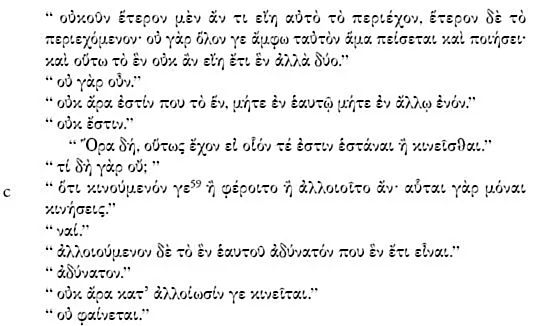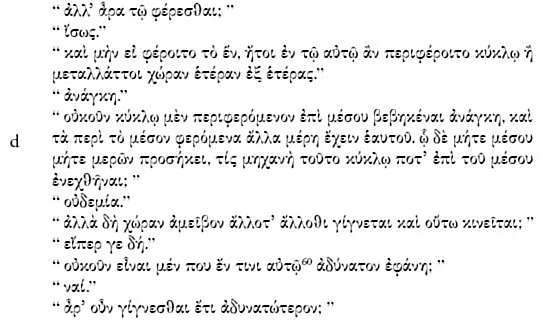
eBook - ePub
Plato's Parmenides
This is a test
Compartir libro
- 272 páginas
- English
- ePUB (apto para móviles)
- Disponible en iOS y Android
eBook - ePub
Plato's Parmenides
Detalles del libro
Vista previa del libro
Índice
Citas
Información del libro
Plato's Parmenides presents the modern reader with a puzzle. Noted for being the most difficult of Platonic dialogues, it is also one of the most influential. This new edition of the work includes the Greek text on facing pages, with an English translation by Arnold Hermann in collaboration with Sylvana Chrysakopoulou. The Introduction provides an overview and commentary aimed at scholars and first time readers alike.
Preguntas frecuentes
¿Cómo cancelo mi suscripción?
¿Cómo descargo los libros?
Por el momento, todos nuestros libros ePub adaptables a dispositivos móviles se pueden descargar a través de la aplicación. La mayor parte de nuestros PDF también se puede descargar y ya estamos trabajando para que el resto también sea descargable. Obtén más información aquí.
¿En qué se diferencian los planes de precios?
Ambos planes te permiten acceder por completo a la biblioteca y a todas las funciones de Perlego. Las únicas diferencias son el precio y el período de suscripción: con el plan anual ahorrarás en torno a un 30 % en comparación con 12 meses de un plan mensual.
¿Qué es Perlego?
Somos un servicio de suscripción de libros de texto en línea que te permite acceder a toda una biblioteca en línea por menos de lo que cuesta un libro al mes. Con más de un millón de libros sobre más de 1000 categorías, ¡tenemos todo lo que necesitas! Obtén más información aquí.
¿Perlego ofrece la función de texto a voz?
Busca el símbolo de lectura en voz alta en tu próximo libro para ver si puedes escucharlo. La herramienta de lectura en voz alta lee el texto en voz alta por ti, resaltando el texto a medida que se lee. Puedes pausarla, acelerarla y ralentizarla. Obtén más información aquí.
¿Es Plato's Parmenides un PDF/ePUB en línea?
Sí, puedes acceder a Plato's Parmenides de en formato PDF o ePUB, así como a otros libros populares de Philosophy y Ancient & Classical Philosophy. Tenemos más de un millón de libros disponibles en nuestro catálogo para que explores.
Información
Categoría
PhilosophyCategoría
Ancient & Classical PhilosophyTEXT AND TRANSLATION*
* From the Preface to PLATO IV, Loeb Classical Library 167: The Greek text is based upon the Codex Bodleianus or Clarkianus (B) and the Codex Venetus Append. Class. 4, cod. 1 (T). Readings not supported by either of these, and occasionally disagreements between these two manuscripts themselves, are noted in the footnotes. Later hands of these manuscripts are designated by the letters b and t. Other manuscripts occasionally mentioned are Codex Venetus Append. Class. 4, cod. 54 (G), and Codex Vindobonensis 54, Suppl. Phil. Gr. 7 (W).
FIRST ARGUMENT
“Well then,” said Parmenides, “‘if it is one’, 53 would not the one be something other than the many?”
— “How could it be [many]?”
PARTS/WHOLE
“Then, there must not be a part of it, nor can it be a whole.”
— “Why?”
“For a part is presumably a part of a whole.”
— “Yes.”
“But what is the whole? Wouldn’t that from which no part is missing be a whole?”
— “Certainly.”
“In both cases, then, the one would consist of parts, since it would be whole and would have parts.”
— “Necessarily.”
“In that way, in both cases the one would be many, rather than one.”
— “True.” [137d]
“Yet it must not be many, but one.”
— “It must.”
“Thus, if the one is to be one, it will neither be a whole nor have parts.”
— “No, it won’t.”
LIMITED/UNLIMITED
“Then, if it has no part, it would neither have a beginning, nor an end, nor a middle, for these kind of things would be parts of it.”
— “Quite right.”
“Furthermore, ‘end’ and ‘beginning’ are the limit of each thing.”
— “How could they not be?”
“Therefore, if the one has neither beginning nor end, it is limitless.”
— “Yes.”
NO SHAPE
“And consequently, it is without shape; for it partakes in neither round nor straight.”
— “How so?” [137e]
“For the round is presumably that whose extremities are everywhere equidistant from its center.”
— “Yes.”
“And straight is that of which the middle stands in between both extremities.”
— “So it is.”
“So the one would have parts and be many, if it were to partake in either a straight or a round shape.”
— “Certainly.”
“Therefore, it is neither straight nor round, since it has no parts either.” [138]
— “Correct.”
NEITHER IN ITSELF, NOR IN ANOTHER—NOWHERE
“Furthermore, being of such a kind, it would be nowhere, because it would be neither in another nor in itself.”
— “How so?”
“If it were in another, it would presumably be surrounded all around by that in which it would be contained, and it would be in contact with this thing in many places with many parts. But since it is one and without parts, and since it does not partake of all-aroundness, it cannot possibly be in contact all around in many different places.”
— “It could not.”
“Yet, conversely, if it were in itself, what contains it would be no different than itself, if indeed it were in itself, for it is impossible for a thing [138b] to be in something that does not contain it.”
— “Impossible indeed.”
“So the container itself would be one thing, and the contained another, because the same thing as a whole will not be able both to undergo and to act at the same time. And so the one would no longer be one but two.”


— “It would not.”
“Therefore the one is not anywhere, neither in itself nor in another.”
— “It is not.”
MOTION/REST
“If this is the case, consider then whether it can be at rest or in motion.” 61 —
“Yes, why not?”
“Because if it were in motion it would either change place or alter its character, since these are the only motions.” 62 —
“Yes.”
“But it is impossible for the one to alter itself and still be somehow one.” [138c]
— “Impossible.”
“So it does not move by altering its character.”
— “Apparently not.”
“But by changing place?”
— “Perhaps.”
“And yet if the one moved spatially, then it would either revolve around itself or change from one place to another.”
— “Necessarily.”
“Well, if it r...